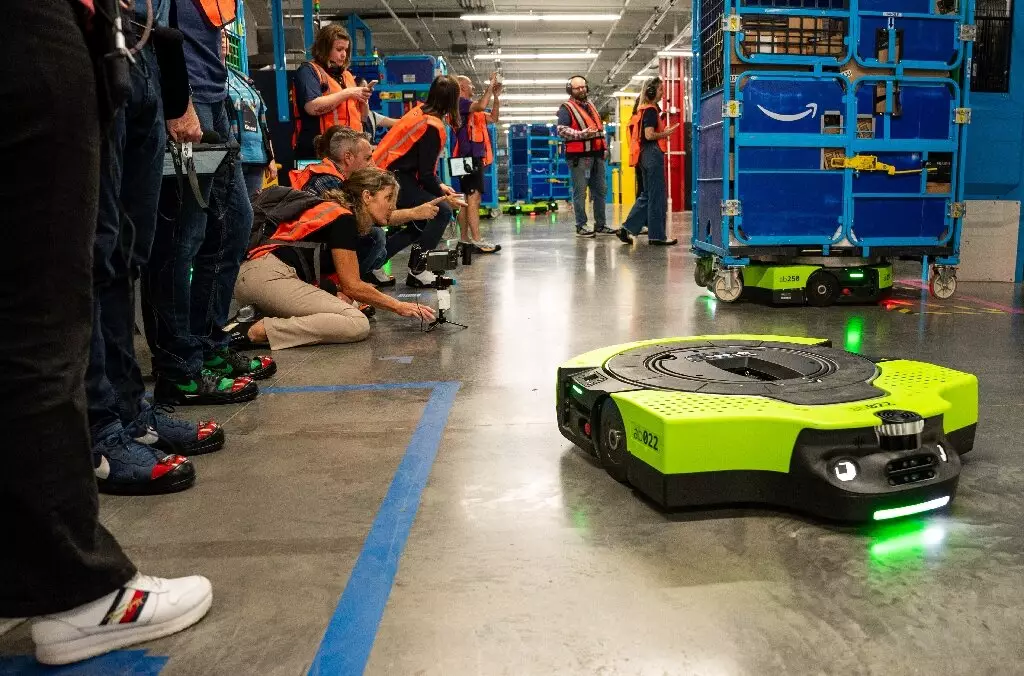Amazon’s trajectory has transformed it from a simple online bookstore into an omnipresent entity that permeates various aspects of modern living. The company is not merely adapting to the e-commerce landscape; it is actively reshaping it. Recently, Amazon unveiled several innovations aimed at enhancing its already expansive reach, from logistics advancements to deeper integration in healthcare and entertainment.
One of the latest initiatives introduced by Amazon’s logistics head, Doug Herrington, involves a cutting-edge computer system for delivery vans. This technology seems destined to optimize delivery times significantly, reflecting Amazon’s commitment to speed—an obsession that has become synonymous with its brand. Herrington is optimistic about the upcoming year, stating, “For 2024, we’re going to have the fastest Prime delivery speeds around the world.” This assertion is grounded in the impressive data showing that by streamlining operations, Amazon managed to cut substantial costs per unit shipped last year. Such improvements not only benefit the company but also incentivize consumers to continue turning to Amazon for its rapid delivery capabilities.
While these enhancements are praiseworthy, they do prompt concerns about the underlying pressure this efficiency may place on delivery personnel, raising questions about working conditions in Amazon’s warehouses. The balance between speed and employee well-being remains a precarious one, and critics have voiced apprehension over the working environment in Amazon’s extensive logistics network.
Alongside logistics, Amazon is venturing into the healthcare sector with its One Medical service. For a modest monthly fee, Prime members can access video consultations and prescription services, reflecting a growing trend towards telehealth. As Hannah McClellan, head of Amazon Pharmacy, noted, “We’re building a pharmacy in your pocket,” indicating a robust commitment to merging healthcare with convenience. The integration of pharmacy services with rapid delivery offers a unique value proposition, especially as Amazon aims to have a significant portion of its customers receiving prescriptions within 24 hours by the next year.
This innovative approach to healthcare not only positions Amazon as a disruptor in the pharmacy market but also aligns with analysts’ views that suggest Amazon is striving to create an ecosystem that provides comprehensive services under one umbrella. However, this intrusion into healthcare raises ethical discussions regarding data privacy and security, as Amazon collects and analyzes vast amounts of consumer health information.
To enhance customer experience further, Amazon is leveraging artificial intelligence in product listings to create more personalized shopping experiences. By tailoring product descriptions to individual preferences, these AI tools aim to bridge the gap between consumer interest and completed purchase. Such innovations may revolutionize how products are marketed online, making Amazon the go-to platform for personalized shopping.
Automation is also making significant inroads in Amazon’s logistics centers, where robotic systems manage the placement of packages. Julie Mitchell, Amazon’s robotics manager, highlights that this automation enhances safety and allows human employees to engage in more meaningful tasks. However, the benefits of automation come hand in hand with risks, particularly when considering reports of workplace safety issues linked to the relentless pace demanded in these environments.
Amazon operates a multifaceted business model that encompasses retail, advertising, cloud computing, and now healthcare. Each component seems to feed back into a self-reinforcing cycle, often referred to as the “flywheel effect.” As eMarketer analyst Suzy Davidkhanian notes, “Amazon Prime membership is the glue that keeps everything together.” This model keeps consumers within Amazon’s ecosystem, making it increasingly challenging for competitors to keep pace.
However, this expansive approach has not gone without scrutiny; Amazon is currently facing legal challenges related to alleged antitrust violations. Critics contend that the company’s increasingly monopolistic behaviors stifle competition, raising questions about the long-term viability of its business practices and their implications for market health.
Amazon’s relentless push to enhance its offerings—from hyper-efficient logistics to personalized healthcare services—paints a picture of a company that is not just interested in growth but also in embedding itself into the everyday lives of its consumers. Yet, this strategy is fraught with challenges and ethical implications that could alter consumer perceptions and regulatory landscapes. The company’s future success will ultimately hinge on its ability to navigate these complexities while maintaining the level of trust that its vast user base has come to expect. As Amazon continues to innovate, it will be crucial for the company to balance efficiency with ethical responsibility across all its operations.

